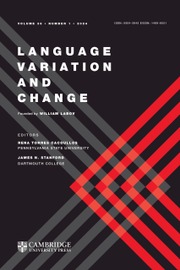Article contents
Variation patterns in across-word regressive assimilation in Picard: An Optimality Theoretic account
Published online by Cambridge University Press: 27 June 2002
Abstract
Before the advent of Optimality Theory (OT), quantitative variation patterns were usually regarded as the outcome of a selection between categorical grammars (see Bailey, 1973; Bickerton, 1973, among others). In a constraint-based approach, like OT, one is able to account for variation without resorting to a separate grammar for each variant, since the framework allows for variation to be encoded in (and therefore predicted by) a single grammar, through variable ranking (or crucial nonranking) of constraints. Along the lines of Reynolds (1994) and Anttila (1997), this study supports the view that, from the predictions determined by a language-specific set of variably ranked constraints, it is possible to establish quantitatively the probability of application of each variant inherent to the variation process. As a consequence, the analysis of across-word regressive assimilation in Picard attempts to incorporate into the grammar of the language both abstract knowledge and quantitative patterns of language use.
- Type
- Research Article
- Information
- Copyright
- © 2001 Cambridge University Press
- 5
- Cited by


